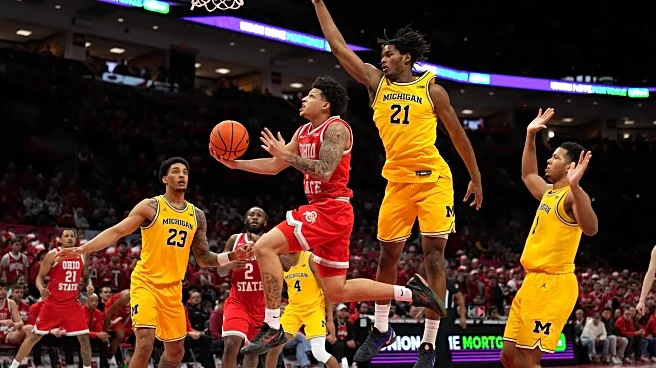What's Happening?
Chad Michael Murray, known for his role as Lucas Scott on the popular TV series 'One Tree Hill,' recently expressed his dissatisfaction with a particular scene from the show. During a conversation with James
Lafferty, who played his character's half-brother Nathan Scott, Murray recalled pleading with the show's creators to exclude him from a scene he deemed 'terrible.' The scene in question involved Lucas' father, Dan, played by Paul Johansson, who was about to receive a heart transplant. The dramatic moment turned comedic when the EMT carrying the organ dropped it, leading to a golden retriever consuming the heart. Murray highlighted the improbability and absurdity of the scene, noting the various fictional elements that had to align for such an event to occur. Despite his objections, the scene was filmed and became infamous among fans of the show.
Why It's Important?
The scene's notoriety underscores the challenges actors face when dealing with creative decisions that may not align with their vision for their characters. Murray's comments reflect broader discussions in the entertainment industry about the balance between dramatic storytelling and maintaining credibility within a narrative. This incident also highlights the impact of meme culture on television, where scenes can gain a life of their own beyond their original context. For fans and critics, such moments can either enhance the show's legacy or detract from its overall reception. The scene's absurdity has become a talking point, illustrating how creative choices can influence public perception and the lasting impact of television narratives.
What's Next?
While the scene remains a part of 'One Tree Hill's' legacy, Murray's reflections may prompt discussions among creators and actors about the importance of collaboration and feedback in the creative process. As television continues to evolve, there may be increased emphasis on ensuring that dramatic moments serve the story and characters effectively. Fans of the show may revisit the series with a new perspective, considering the behind-the-scenes dynamics that shaped its production. Additionally, Murray's comments could inspire other actors to speak out about their experiences, potentially influencing future storytelling approaches in the industry.
Beyond the Headlines
The scene's comedic mishap raises questions about the ethical considerations in storytelling, particularly when dealing with sensitive topics like medical emergencies. It also reflects the cultural shift towards embracing humor in dramatic contexts, a trend that can both entertain and challenge audiences. The incident serves as a reminder of the power of television to create memorable moments, whether through intentional storytelling or unexpected outcomes. As the entertainment industry continues to navigate the balance between drama and comedy, such scenes may become case studies in creative decision-making.










